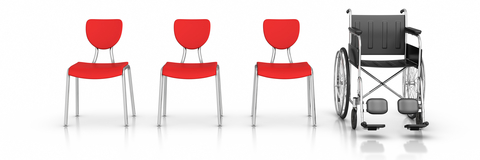Awareness about Spinal Injury and Invisible Disability by Brenda Bondy-Caldicott
As I write this today, I still feel like I’m writing someone else’s story. I’ll call it, “Health Care Worker suddenly becomes Primary Care Giver”.
We all relate to hearing stories about someone with Sciatica. Well, for 2 months my hubby worked with it, knowing he’d likely need time off if it was going to be a long time until it resided.
One day, the pain after working all day became excruciating. We went to our trusted massage pain doctor. He informed us he’d be calling an ambulance if we didn’t take ourselves to the ER and that my hubby would need emergent surgery.
We were shocked to hear that. We didn’t even have our coats with us or our affairs in order back home, yet we were rushed to Toronto, as they explained to us that a Spinal Compression was causing the weakness and onset of paralysis. They had a short window of time to minimize nerve damage, but that window had long passed as he had worked for weeks with the pain.
Since that weekend I’ve been his Primary Care giver. He has permanent bowel and bladder paralysis, and is at risk of falls (and has already had a few), and he also now has foot drop, not to mention constant nerve pain and exhaustion. Depression set in autonomically because of the signals being messed up, and also because he’s 42 and forced into not being able to work.
He also has autonomic dysfunction and has had a few scary attacks. His blood pressure is a problem, as well as his passing out at times.
We’ve had little support, if any, from doctors here. We’ve just had visits to the Neurologist in Toronto.
I’ve had no help. As Primary Care giver I cant work very long as Im needed at home. There are many tests still to come, as well as rehab sessions in order to learn to function with what’s left after Spinal Injury. So, I’m caregiver at home and not in the community any longer.
Like hubby, as we go through this together I too feel less than useful at times, but somehow it’s where I need to be. I feel empathy for anyone going through disability, especially an invisible one as there is so much judgement to face and little financial help offered. One day you’re working and have sciatica, or so you thought. Then, voila! You’re two days from the wheelchair but can luckily still walk, though only slowly, carefully and painfully. Invisible paralysis has set in.
Even the doctors don’t know a lot about Cauda Equina Syndrome.
I don’t quite absorb what the tests will do, as there is no cure for Spinal Injury.
We’re hopeful that someday they will find a way to regenerate damaged nerves.
And we are thankful for every day without an attack of autonomic dysfunction, and for family. We educate friends who have sciatica. If you experience numbness or paralysis do all in your power to make someone listen to you. The spinal canal is your whole nerve system. If the root nerves are damaged, that will affect everything. Even sleep dysfunction is common.
Be an advocate for your own health. Continue to make doctors and loved ones listen to you during your sciatica recovery so that no stone goes unturned. It is life changing. I’ve seen this throughout my hubby’s struggle with disability and depression. There’s an element of grief that comes with the sudden loss of friends, loss of independence, loss of thoughts and dreams for the future, loss of security, etc.
Thanks for listening.
People are curious as they don’t often know about this issue. Many don’t believe it could happen to them. I’m here to say that if your disc ruptures into your spinal canal, it’s that quick and can happen to anyone.
